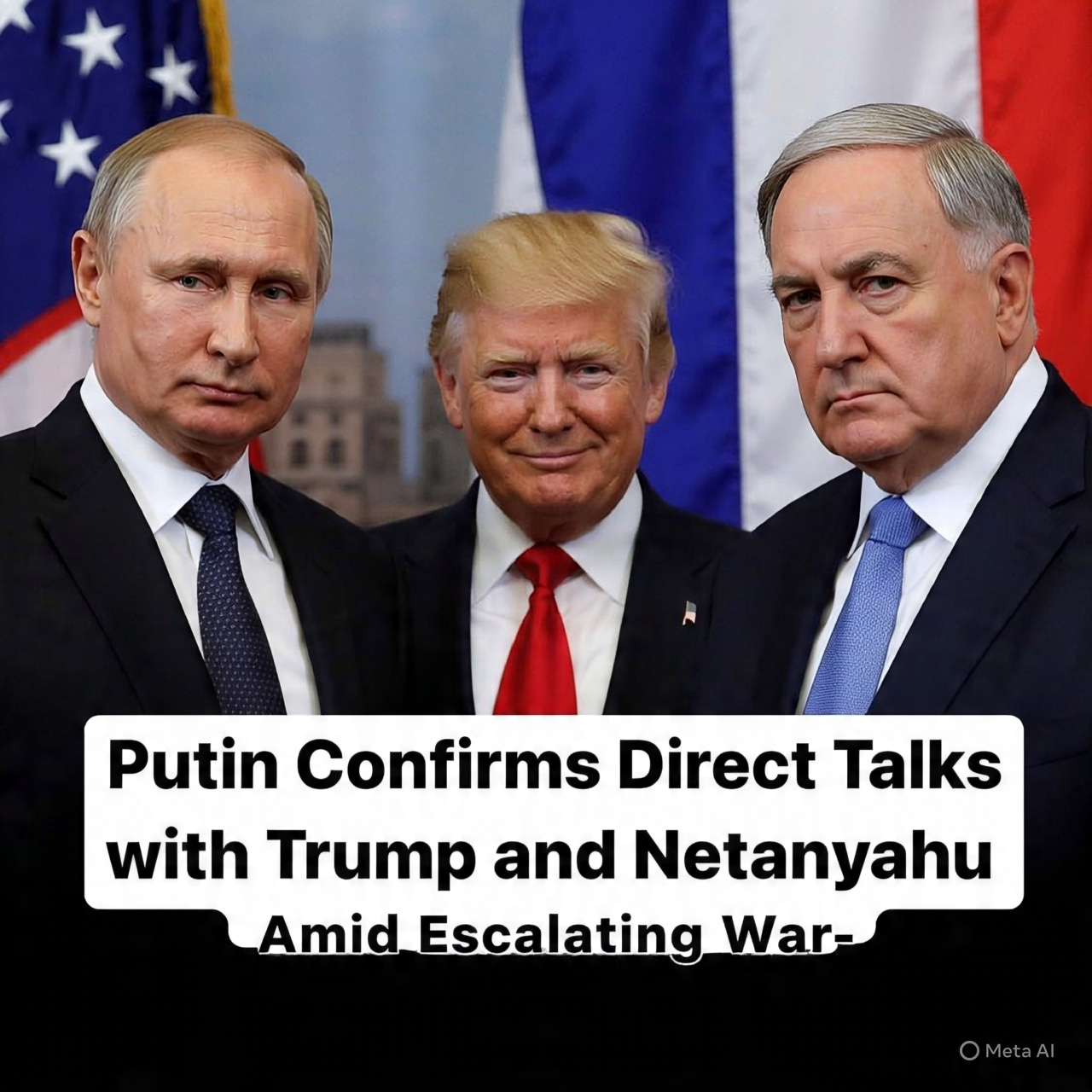FnF News
🌍 FNF News | Global Conflict & Diplomacy
Published: June 18, 2025
By: Khadija Khan, Senior Foreign Affairs Editor
JUST IN: Putin Confirms Direct Contact with Trump and Netanyahu Over Iran-Israel War
Moscow, Russia — In a stunning and globally significant revelation, Russian President Vladimir Putin announced today that he is in direct contact with former U.S. President Donald Trump and Israeli Prime Minister Benjamin Netanyahu as the conflict between Iran and Israel intensifies into what analysts are calling the most dangerous escalation in the Middle East in two decades.
Speaking during a nationally televised press conference in St. Petersburg, Putin stated:
“We are in contact with several international partners, including Mr. Trump and Prime Minister Netanyahu. These are complex discussions concerning the nature of the conflict, the need for containment, and the global consequences of further escalation.”
The statement marks the first official confirmation that Trump—despite not holding public office—has been actively engaged in high-level diplomatic backchannel communications regarding the war.
Conflict Overview: A Regional Flashpoint Goes Global
The Iran-Israel conflict, which began with a massive drone-and-missile exchange two weeks ago following the assassination of an IRGC general in Syria, has now spiraled into a regional military standoff, drawing in airspace alerts, cyberattacks, and unprecedented diplomatic posturing.
Israel has conducted limited airstrikes on Iranian missile depots near Isfahan, while Iran retaliated with proxy-based rocket attacks via Hezbollah and the Houthis targeting Israeli and Saudi infrastructure.
The U.S. 5th Fleet remains stationed in the Gulf, though the White House has refrained from initiating direct military action, sparking criticism from both neoconservatives and anti-interventionists.
Trump’s Shadow Diplomacy: Return of the Deal-Maker?
Trump’s involvement in backchannel talks comes as no surprise to insiders. Despite being out of office, he maintains strong relationships with Middle Eastern leaders, including Netanyahu and Saudi Crown Prince Mohammed bin Salman.
According to sources close to the Trump campaign, the former president views the conflict as a “failure of Biden-era deterrence” and has offered himself as an “unofficial intermediary” to prevent an all-out war.
“Trump still commands influence in Jerusalem and Riyadh,” said Dr. Reuel Marc Gerecht, a former CIA officer. “Putin likely sees Trump as a wildcard who can pressure Netanyahu and possibly moderate Iranian aggression through backdoor Gulf channels.”
Trump’s office has yet to release a formal statement but is reportedly preparing a “peace framework” proposal to be released at the upcoming America First Policy Institute summit.
Why Is Putin Involved?
Russia’s motivations are deeply strategic. While Russia and Iran maintain military ties in Syria and economic cooperation via sanctions-evading oil trade, Putin also seeks to stabilize global oil prices and retain diplomatic relevance amid prolonged Western isolation.
Moscow has expressed concern over the potential for the Iran-Israel war to trigger a broader NATO-aligned conflict, especially if Israel is attacked directly on a scale that draws in the United States.
“A regional war is not in Russia’s interest—nor China’s,” said Tatiana Stanovaya of R.Politik. “Putin sees value in being the middleman between unpredictable actors.”
This marks a rare triangle of communication: a Kremlin authoritarian, a nationalist ex-U.S. president, and Israel’s hardline prime minister—all entangled in managing a regional conflict threatening global energy markets and strategic alliances.
Netanyahu: Balancing Fire and Fragility
Prime Minister Benjamin Netanyahu, whose governing coalition has grown increasingly hawkish, has confirmed receiving “unofficial offers of mediation” but did not name Trump or Putin explicitly.
However, Israeli officials told FNF News off the record that “all channels are being explored” as Hezbollah rockets reach Tel Aviv’s outskirts and Iranian threats against Dimona and Haifa intensify.
“Bibi is stuck between security imperatives and political survival,” said Jerusalem-based analyst Einat Levy. “Putin’s involvement adds complexity, and Trump’s role might actually help Netanyahu justify a strategic pause to his far-right base.”
U.S. Response: Cautious but Watching
The Biden administration has issued no public acknowledgment of Trump’s or Putin’s involvement. National Security Adviser Jake Sullivan told reporters:
“We continue to monitor all diplomatic efforts. The U.S. is focused on de-escalation through official state channels.”
Privately, however, State Department staff reportedly view Trump’s moves as “unhelpful freelancing”, though acknowledge his influence in the region is “not to be dismissed.”
Conclusion: Unofficial Hands in an Official War
The war between Iran and Israel is no longer a two-country affair. With world powers quietly entering the ring, and non-state actors escalating daily, this conflict is becoming a proxy for global realignment.
As bizarre as it sounds, the road to peace may now include a Russian president, an ex-U.S. president, and a prime minister with everything to lose.
And the question on everyone’s mind: can diplomacy—no matter how unconventional—outpace the next missile?

